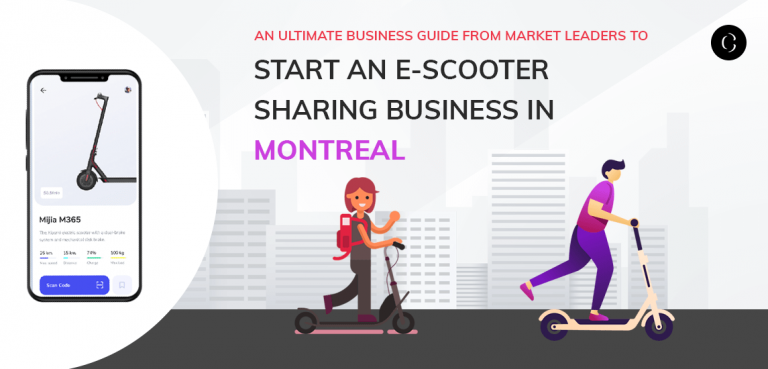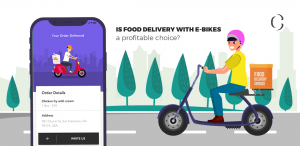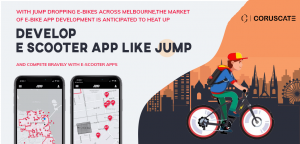An ultimate business guide from market leaders to start an e-scooter sharing business in Montreal, Canada

With many Canadian cities legalizing the use of e-scooters on public roads, the Canadian micro-mobility market is going through halcyon days. Many big players like Lime, Bird, and Jump have already dropped their e-scooters across tier-1 Canadian cities like Montreal and Calgary.
However, the Canadian micro-mobility market is less explored than European and American micro-mobility markets. And so, many Canadian entrepreneurs who want to start an e-scooter sharing business in Canada struggle a lot to collect very crucial data to identify the market characteristics and user groups. This lack of information many times leads them towards the dead-end from where they can’t figure out the direction to their goals.
Considering the gravity of the situation, we have previously shared many important details of the Canadian micro-mobility market in our dedicated blog (e-scooter app development in Canada). We’ve also put forth a dedicated blog containing 3 easy steps to start an e-scooter sharing business in Calgary, Canada.
Today, in this blog, we will discuss the most common questions (and their answers) all entrepreneurs have before starting an e-scooter sharing business in Montreal where the city council has already been running a pilot program after legalizing the e-scooter.
10 most crucial questions answered to successfully start an e-scooter sharing business in Montreal, Canada
Question #1: Is it a safe bet to start an e-scooter sharing business in Montreal?
The success of many global and even the local micro-mobility startups depict that a startup running an e-scooter sharing business anywhere in the world is most likely to be successful. However, there are many factors that still influence the performance of micro-mobility startups. These factors include government regulations, competition, and e-scooter-friendly infrastructure.
Talking specifically about Montreal, the government has already imposed many harsh yet clear and straightforward e-scooter laws. These clear and straightforward e-scooter laws save a lot of time and do not drag micro-mobility startups into ‘unexpected’ legal battles.
The infrastructure of the Montreal city is also e-scooter-friendly. Less congested streets, a network of the dedicated bicycle lanes and pedestrian paths make it very easy for e-scooter riders to navigate safely through the city.
And most importantly, the Montreal micro-mobility market has not been intensified yet. Only two micro-mobility startups – Lime and Jump – are running their business in Montreal. Meaning, a huge room is still available for new micro-mobility startups to maneuver.
Question #2: Will I ever acquire the permit?
A permit is the most important thing to start an e-scooter sharing business. Without it, it is impossible to drop even a single e-scooter on a public road. Though many micro-mobility startups face a challenge to acquire the permit, you can easily acquire it if you follow best practices and get help from experts.
To acquire the permit, a micro-mobility startup is needed to submit the permit application. In that permit application, a micro-mobility startup has to demonstrate strategies to obey the laws imposed by the government. The city council later takes your proposed business strategies into account to make a final decision on your permit application.
Since business strategies you have to mention in permit application cover a wide array of business processes, it is a challenging task for an individual to find out the business strategies for each business process. Hence, it is advisable to leave it on the shoulders of the experts.
There are many e-scooter app development companies like Coruscate which do not just build e-scooter apps but also help micro-mobility startups to acquire the permit.
Question #3: What are the e-scooter laws in Montreal?
- The weight of the e-scooter should not be more than 45 kg.
- The e-scooter should be equipped with an emergency stop switch to cut supply to the motor.
- An e-scooter rider must be 18 years of age or older.
- An operator should offer the training program to first-time users.
- A rider should wear a helmet while riding an e-scooter.
- A rider isn’t allowed to ride an e-scooter on sidewalks and roads where the speed limit is beyond 50 km/h.
- A rider should not carry another passenger, haul the trailer or push or push any other object.
- It is outlawed to ride a modified e-scooter.
You can view here the full list of the e-scooter laws in Montreal.
Question 4: Can I able to run the e-scooter sharing business in Winter?
In Winter, it is extremely dangerous for riders to ride e-scooters on snowy roads. Thus, the Montreal city council has banned the operation of the e-scooter sharing business in winter. You are only allowed to run your business between April 15 to November 15.
Question 5: How can I stop losing money in winter?
By simply changing the app development approach, you won’t experience any financial burden in winter. An e-scooter app subscription plan costs really less than the custom app development. During winter, you can withdraw your membership and when the mercury rises again, join the program again. This way, you won’t lose money in winter.
At Coruscate, in addition to custom e-scooter app development, we offer a subscription plan for the feature-packed white label e-scooter app which starts from just $500!
Question #6: Which one is the best e-scooter hardware I can buy in Canada?
Micro-mobility startups giving cold shoulder to e-scooter hardware generally end up affecting the user experience and increasing the maintenance cost and efforts. Proper e-scooter hardware does not only help micro-mobility startups to ensure the safety of the riders, but it also helps them to keep retention rate high and maintenance-cost low.
You can read our dedicated blog to know the best e-scooter hardware you can buy under $500 and $1000.
Question #7: How does e-scooter hardware communicate with the mobile app?
The IoT controller fitted in the e-scooter hardware establishes the connection with the backend of the e-scooter app. It then sends information of particular e-scooter to the backend of the mobile app. It also receives the information (commands) from the backend of the mobile app.
Here, it is worth mentioning that you can buy affordable e-scooters which do not come with the IoT controller. You can later buy separate IoT controllers and fit them in e-scooters.
Question #8: What are the top e-scooter app and admin panel modules?
E-scooter app modules:
- Profile
- Tutorial
- E-scooter discovery
- E-scooter booking
- E-scooter group booking
- E-scooter unlocking/locking
- Fare
- Ride information
- Payment
- Ride history
- Customer service
E-scooter app admin panel modules:
- User management
- Rider management
- Vehicle management
- Ride management
- Payment management
- Dispute management
- Fare management
We integrate all of these modules in the most basic e-scooter app. And when a client has a requirement to build an e-scooter app with unique features, we push the boundaries and add many disruptive features.
Question 9: What are the top ‘e-scooter app user groups’ in Montreal?
To offer personalized user experience, identifying user groups is very essential. Our business experts have ceaselessly studied the micro-mobility market of Montreal and revealed 4 most potential user groups of the e-scooter app. These are commuters, university students, tourists, and casual users. All of these user groups have different requirements and characteristics. Thus, a micro-mobility startup is encouraged to do justice with every user by adding dedicated features for each user group.
To know the list of dedicated features for each user group, you can read our dedicated blog.
Question 10: How much does it cost to build the e-scooter app in Montreal?
Coruscate is the top e-scooter app development company that has developed 10 e-scooter apps for different markets. We accommodate 100+ well-schooled app developers, app designers, IoT engineers, business experts, and legal advisors who all work parallel to make your business journey painless.
Our business experts and legal advisors help micro-mobility startups to get the permit, decide on the business model, select the e-scooter hardware, and draft the business plan.

The cost to build an e-scooter app in Montreal depends on the app development approach you choose.
- To develop a custom e-scooter app with all custom features, we charge somewhere between $15000 to $25000.
- The price to develop the clone version of some popular e-scooter app starts from $10000.
- And our subscription plan for the white label e-scooter app starts from just $500.
To know more about our pricing structures and get the personalized quote, please feel free to contact us. Our one of the senior business experts will welcome you with the free e-scooter app demo and free consultation.
Note: We do not make clones of any exact application, clone means to us is how better we can execute your app idea with existing app features and experience.








